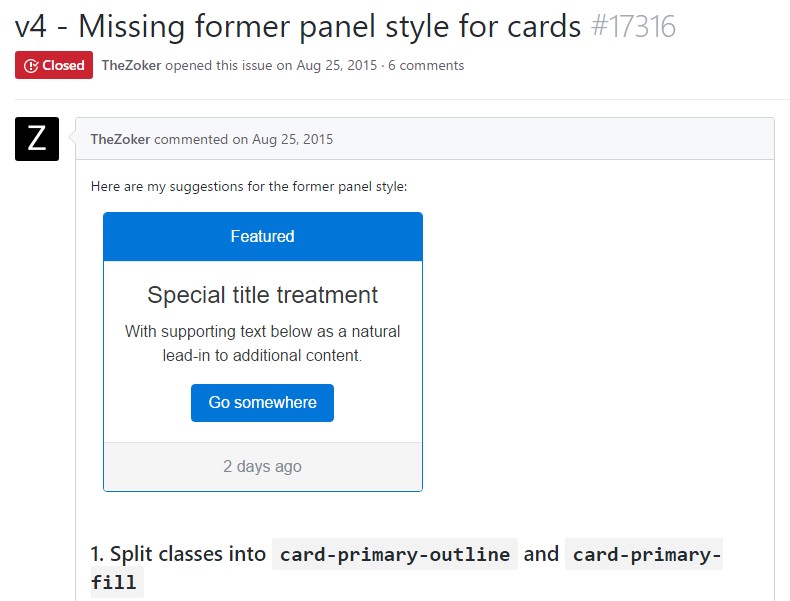Bootstrap Panel Example
Introduction
In many cases we should split up some little (or not so much) components of information in order to force them stand up and get the guest's interest-- such as noting several helpful features offering a selection of posts along with a small extract and a single effective image and so on and on.
Thus we require a beneficial solution to beautifully wrap our information in a flexible and stunning way to have it pleasant and tidy shown on our sites. In the latest version of the most trendy flexible framework-- Bootstrap 3 we used mainly the Bootstrap Panel Body, thumbnail and well elements delivering us box containers with a subtle border, quite elliptical corners and finally-- a slight 3d outcome. In the latest Bootstrap 4 framework, these are no more. They get got upgraded collectively by the card element declaring to be efficient in basically whatever the previous features can do but only improved. So it's the right moment to get to know it better.
Approaches to add the Bootstrap Panel Table:
The cards are softly styled containers capable of holding practically any HTML content within as well featuring a many predefined styling possibility for appropriately showcasing its content. It also additionally can have a header and a footer.
In order to make a card we first require a .card element to cover the whole thing up. Inside it separate covers for the header .card-header, the genuine card content .card-block and the footer .card-footer should take place and while the header and footer are somewhat optional and could be left out if you don't want them the .card-block is the necessary component-- it suitably covers your content supplying some thin padding around.
Inside the .card-block item you can have a label having the class .card-title which can be added to theh1-- h6 headings as well as to a regular <div> and fo course -- come text wrapped in a paragraph with the .card-text class. If you decide to insert some links along-- assign them the .card-link class to get them correctly separated for greater user interaction.
The contextual different colors classes could be used to further style your complete card parts easily-- simply add a .card- ~ one of the contextual colors here like primary, success, info or danger here ~ to the main .card wrapper and if the background becomes a bit overly dark for the content to be legible enough-- additionally add the .card-inverse class to alter the text color. You can also style only the line colour using the contextual palette-- this gets completed by adding the .card-outline- ~ the needed colour ~ class again to the primary .card item.
As mentioned before the .card-block appears to cover the content remaining a notable padding around it. However when it involves images this might wish to prevent this and get the picture expanded the whole width of the item.
To get this appearance just place the <div class="img"><img></div> tag outside the .card-block so you avoid the paddings eventually including style=" width:100%;" making sure this will resize correctly always filling in its container.
Here are some quite useful positioning classes additionally like .card-img-top and .card-img-bottom aligning the image at the top or the bottom of the card. And if you wish to position it somewhere in between the text just break the .card-block, insert the pic and start a new .card-block to insert the content you want placed right after the pic-- numerous card blocks are supported. Eventually you may also want to include some words over the pic-- cover it inside a <div> having the .img-overlay class.
Some words about the design-- cards will occupy the complete horizontal area available by default so it's a good idea controling it by placing them inside some grid elements. This way you can achieve their expected actions.
Some case
Cards are developed with as little markup and styles as possible, but still handle to provide a plenty of control and customization. Designed with flexbox, they deliver easy placement and combine well with other Bootstrap elements.
Beneath is an example of a fundamental card with combined content and a set width. Cards have no certain width to start, so they'll typically fill the entire width of its parent section. This is conveniently modified with several sizing choices.
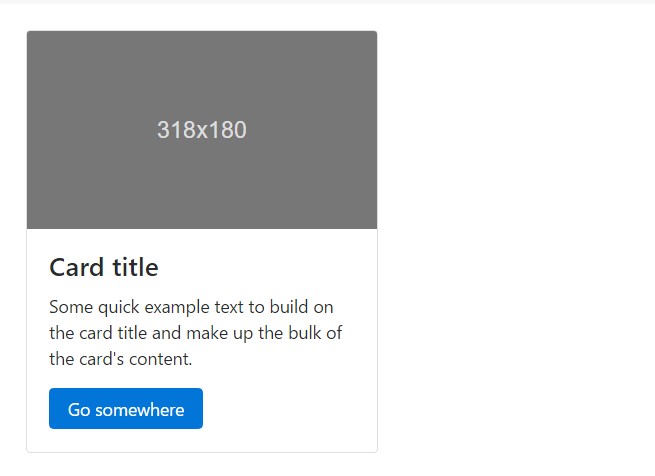
<div class="card" style="width: 20rem;">
<div class="img"><img class="card-img-top" src="..." alt="Card picture caption"></div>
<div class="card-block">
<h4 class="card-title">Card caption</h4>
<p class="card-text">Some fast sample message to build on the card title as well as compose the bulk of the card's material.</p>
<a href="#" class="btn btn-primary">Go somewhere</a>
</div>
</div>Web site material kinds
Cards maintain a large range of content, including pics, text message, list collections, hyperlinks, and more. Here are illustrations of what's supported.
Blocks
The building block of a card is the .card-block. Use it when you require a padded area within a card.

<div class="card">
<div class="card-block">
This is some message in a card block.
</div>
</div>Titles, message, and links
Card titles are utilized by adding .card-title to a <h*> tag. In a similar way, hyperlinks are included and placed next to each other by adding .card-link to a <a> tag. Subtitles are handled by including a .card-subtitle to a <h*> tag. In case the .card-title and the .card-subtitle items are put in a .card-block element, the card title and subtitle are positioned nicely.

<div class="card">
<div class="card-block">
<h4 class="card-title">Card title</h4>
<h6 class="card-subtitle mb-2 text-muted">Card subtitle</h6>
<p class="card-text">Some fast example message to improve the card title and compose the mass of the card's content.</p>
<a href="#" class="card-link">Card link</a>
<a href="#" class="card-link">Another link</a>
</div>
</div>Illustrations
.card-img-top spots an image to the head of the card. With .card-text, text can be added to the card. Text within .card-text may also be styled with the regular HTML tags.
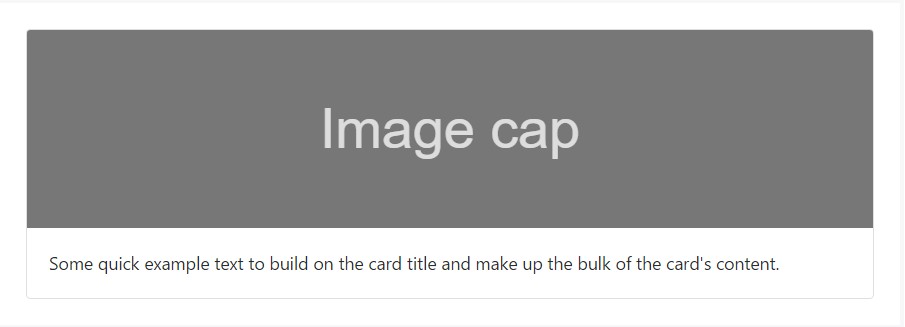
<div class="card">
<div class="img"><img class="card-img-top" src="..." alt="Card picture cap"></div>
<div class="card-block">
<p class="card-text">Some fast example message to build on the card title and also compose the bulk of the card's web content.</p>
</div>
</div>Selection groups
Produce lists of content in a card along with a flush list group.

<div class="card">
<ul class="list-group list-group-flush">
<li class="list-group-item">Cras justo odio</li>
<li class="list-group-item">Dapibus ac facilisis in</li>
<li class="list-group-item">Vestibulum at eros</li>
</ul>
</div>Mix and fit different material sorts to generate the card you wish, or toss everything in there.Displayed right here are picture formats, blocks, information designs, and a list group - all covered in a fixed-width card.

<div class="card" style="width: 20rem;">
<div class="img"><img class="card-img-top" src="..." alt="Card image cap"></div>
<div class="card-block">
<h4 class="card-title">Card title</h4>
<p class="card-text">Some quick example text to build on the card title and make up the bulk of the card's content.</p>
</div>
<ul class="list-group list-group-flush">
<li class="list-group-item">Cras justo odio</li>
<li class="list-group-item">Dapibus ac facilisis in</li>
<li class="list-group-item">Vestibulum at eros</li>
</ul>
<div class="card-block">
<a href="#" class="card-link">Card link</a>
<a href="#" class="card-link">Another link</a>
</div>
</div>Header and footer
Add an extra header and/or footer within a card.

<div class="card">
<div class="card-header">
Featured
</div>
<div class="card-block">
<h4 class="card-title">Unique title therapy</h4>
<p class="card-text">With supporting message below as an all-natural lead-in to extra content.</p>
<a href="#" class="btn btn-primary">Go someplace</a>
</div>
</div>Card headers can be styled by including .card-header to <h*> elements.

<div class="card">
<h3 class="card-header">Featured</h3>
<div class="card-block">
<h4 class="card-title">Special title treatment</h4>
<p class="card-text">With supporting message below as a natural lead-in to extra content.</p>
<a href="#" class="btn btn-primary">Go someplace</a>
</div>
</div>
<div class="card">
<div class="card-header">
Quote
</div>
<div class="card-block">
<blockquote class="card-blockquote">
<p>Lorem ipsum dolor sit amet, consectetur adipiscing elit. Integer posuere erat a ante.</p>
<footer>Someone famous in <cite title="Source Title">Source Title</cite></footer>
</blockquote>
</div>
</div>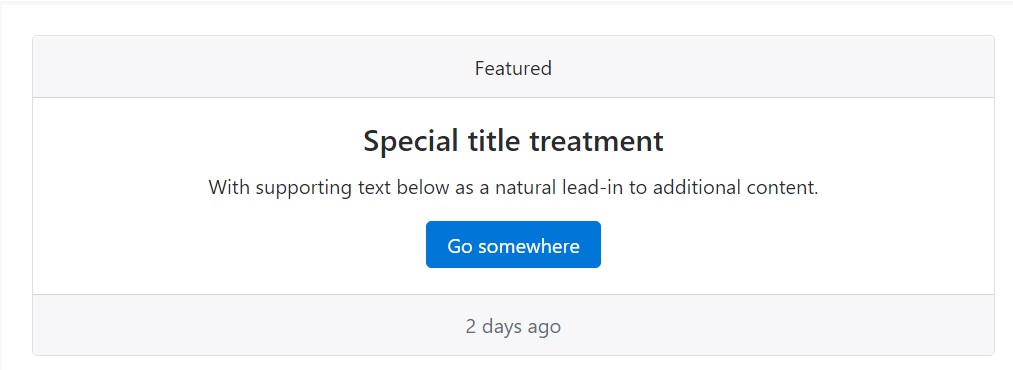
<div class="card text-center">
<div class="card-header">
Featured
</div>
<div class="card-block">
<h4 class="card-title">Special title treatment</h4>
<p class="card-text">With supporting text below as an all-natural lead-in to extra material.</p>
<a href="#" class="btn btn-primary">Go someplace</a>
</div>
<div class="card-footer text-muted">
2 days ago
</div>
</div>Sizing
Cards have no certain width to start, so they'll be 100% wide until something else specified. You may alter this as wanted with custom CSS, grid classes, grid Sass mixins, or utilities.
Using grid markup
Making use of the grid, wrap cards in columns and rows as needed.

<div class="row">
<div class="col-sm-6">
<div class="card">
<div class="card-block">
<h3 class="card-title">Special title treatment</h3>
<p class="card-text">With supporting text below as a natural lead-in to additional content.</p>
<a href="#" class="btn btn-primary">Go somewhere</a>
</div>
</div>
</div>
<div class="col-sm-6">
<div class="card">
<div class="card-block">
<h3 class="card-title">Special title treatment</h3>
<p class="card-text">With supporting text below as a natural lead-in to additional content.</p>
<a href="#" class="btn btn-primary">Go somewhere</a>
</div>
</div>
</div>
</div>Working with utilities
Use handful of offered sizing utilities to promptly establish a card's size.
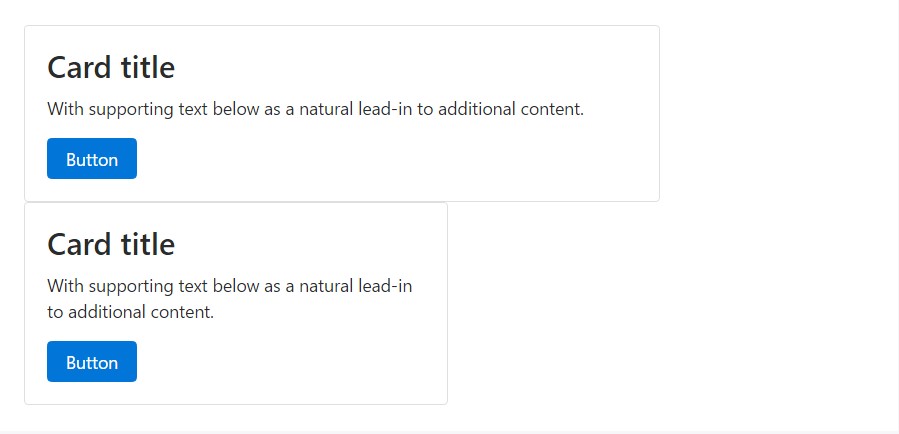
<div class="card w-75">
<div class="card-block">
<h3 class="card-title">Card title</h3>
<p class="card-text">With supporting text below as a natural lead-in to additional content.</p>
<a href="#" class="btn btn-primary">Button</a>
</div>
</div>
<div class="card w-50">
<div class="card-block">
<h3 class="card-title">Card title</h3>
<p class="card-text">With sustaining message listed below as an all-natural lead-in to extra web content.</p>
<a href="#" class="btn btn-primary">Button</a>
</div>
</div>
<div class="card" style="width: 20rem;">
<div class="card-block">
<h3 class="card-title">Special title treatment</h3>
<p class="card-text">With supporting text below as a natural lead-in to added material.</p>
<a href="#" class="btn btn-primary">Go somewhere</a>
</div>
</div>Information setting
You could swiftly transform the text alignment of any type of card-- in its whole or specific parts-- with text align classes.
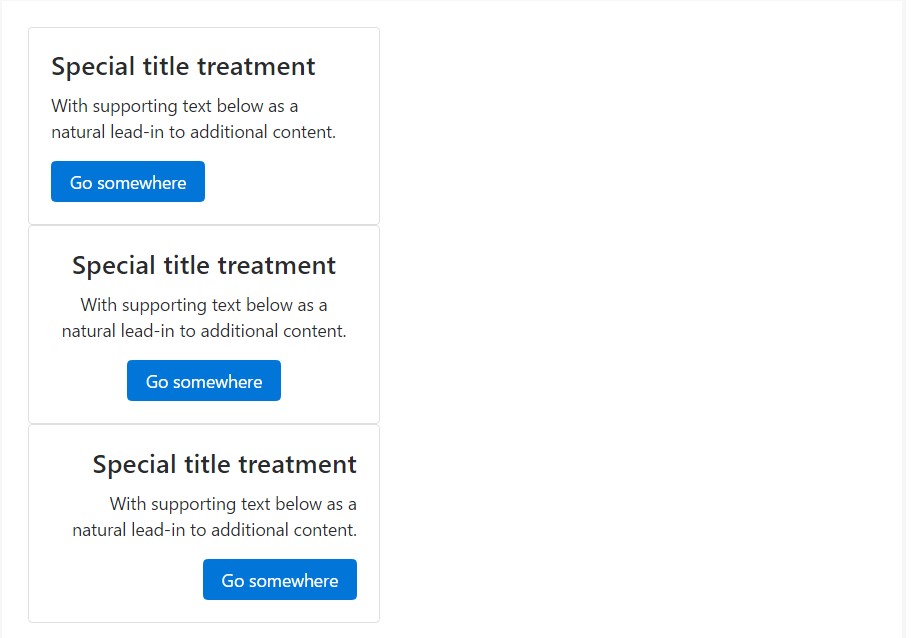
<div class="card" style="width: 20rem;">
<div class="card-block">
<h4 class="card-title">Special title treatment</h4>
<p class="card-text">With supporting text below as a natural lead-in to additional content.</p>
<a href="#" class="btn btn-primary">Go somewhere</a>
</div>
</div>
<div class="card text-center" style="width: 20rem;">
<div class="card-block">
<h4 class="card-title">Special title treatment</h4>
<p class="card-text">With supporting text below as a natural lead-in to additional content.</p>
<a href="#" class="btn btn-primary">Go somewhere</a>
</div>
</div>
<div class="card text-right" style="width: 20rem;">
<div class="card-block">
<h4 class="card-title">Special title treatment</h4>
<p class="card-text">With supporting text below as a natural lead-in to additional content.</p>
<a href="#" class="btn btn-primary">Go somewhere</a>
</div>
</div>Web site navigation
Put some navigation to a card's header (or block) with Bootstrap's nav elements.

<div class="card text-center">
<div class="card-header">
<ul class="nav nav-tabs card-header-tabs">
<li class="nav-item">
<a class="nav-link active" href="#">Active</a>
</li>
<li class="nav-item">
<a class="nav-link" href="#">Link</a>
</li>
<li class="nav-item">
<a class="nav-link disabled" href="#">Disabled</a>
</li>
</ul>
</div>
<div class="card-block">
<h4 class="card-title">Special title treatment</h4>
<p class="card-text">With supporting text below as a natural lead-in to additional content.</p>
<a href="#" class="btn btn-primary">Go somewhere</a>
</div>
</div>
<div class="card text-center">
<div class="card-header">
<ul class="nav nav-pills card-header-pills">
<li class="nav-item">
<a class="nav-link active" href="#">Active</a>
</li>
<li class="nav-item">
<a class="nav-link" href="#">Link</a>
</li>
<li class="nav-item">
<a class="nav-link disabled" href="#">Disabled</a>
</li>
</ul>
</div>
<div class="card-block">
<h4 class="card-title">Special title treatment</h4>
<p class="card-text">With supporting text below as a natural lead-in to additional content.</p>
<a href="#" class="btn btn-primary">Go somewhere</a>
</div>
</div>Images
Cards involve several possibilities for operating using pics. Go with appending "image caps" at possibly end of a card, overlaying images with card content, or simply embedding the image in a card.
Image caps
Similar to footers and headers, cards can feature top and bottom "image caps"-- pics at the top or bottom of a card.
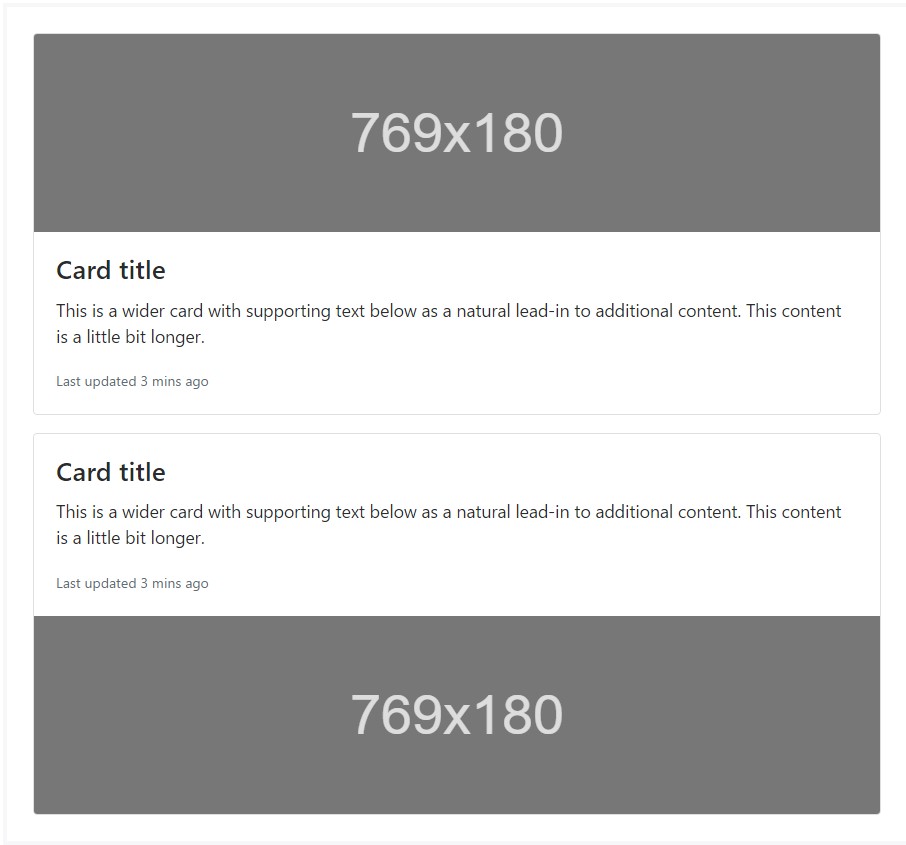
<div class="card mb-3">
<div class="img"><img class="card-img-top" src="..." alt="Card image cap"></div>
<div class="card-block">
<h4 class="card-title">Card title</h4>
<p class="card-text">This is a wider card with supporting text below as a natural lead-in to additional content. This content is a little bit longer.</p>
<p class="card-text"><small class="text-muted">Last updated 3 mins ago</small></p>
</div>
</div>
<div class="card">
<div class="card-block">
<h4 class="card-title">Card title</h4>
<p class="card-text">This is a wider card with supporting text below as a natural lead-in to additional content. This content is a little bit longer.</p>
<p class="card-text"><small class="text-muted">Last updated 3 mins ago</small></p>
</div>
<div class="img"><img class="card-img-bottom" src="..." alt="Card image cap"></div>
</div>Picture cover
Turn an image into a card foundation and overlay your card's text. Basing on the image, you may or may not want .card-inverse (see below).
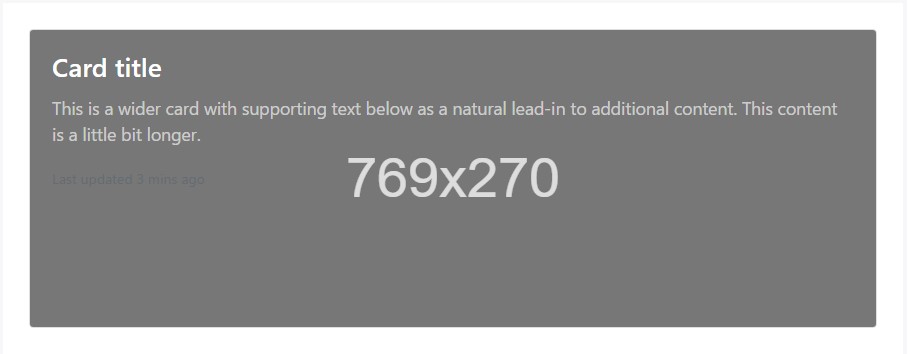
<div class="card card-inverse">
<div class="img"><img class="card-img" src="..." alt="Card image"></div>
<div class="card-img-overlay">
<h4 class="card-title">Card title</h4>
<p class="card-text">This is a wider card with supporting text below as a natural lead-in to additional content. This content is a little bit longer.</p>
<p class="card-text"><small class="text-muted">Last updated 3 mins ago</small></p>
</div>
</div>Card selections
Cards utilize different opportunities for modifying their backgrounds, borders, and color.
Inverted text message
Initially, cards use dark text and assume a light background. You can alter that by toggling the color of text within, as well as that of the card's subcomponents, using .card-inverse. Specify a dark background-color and border-color to go with it.
You may additionally use .card-inverse along with the contextual backgrounds versions.

<div class="card card-inverse" style="background-color: #333; border-color: #333;">
<div class="card-block">
<h3 class="card-title">Special title treatment</h3>
<p class="card-text">With supporting text below as a natural lead-in to additional content.</p>
<a href="#" class="btn btn-primary">Go somewhere</a>
</div>
</div>Background alternatives
Cards feature their own variant classes for rapidly modifying the background-color and border-color of a card. Darker colors require the use of .card-inverse.
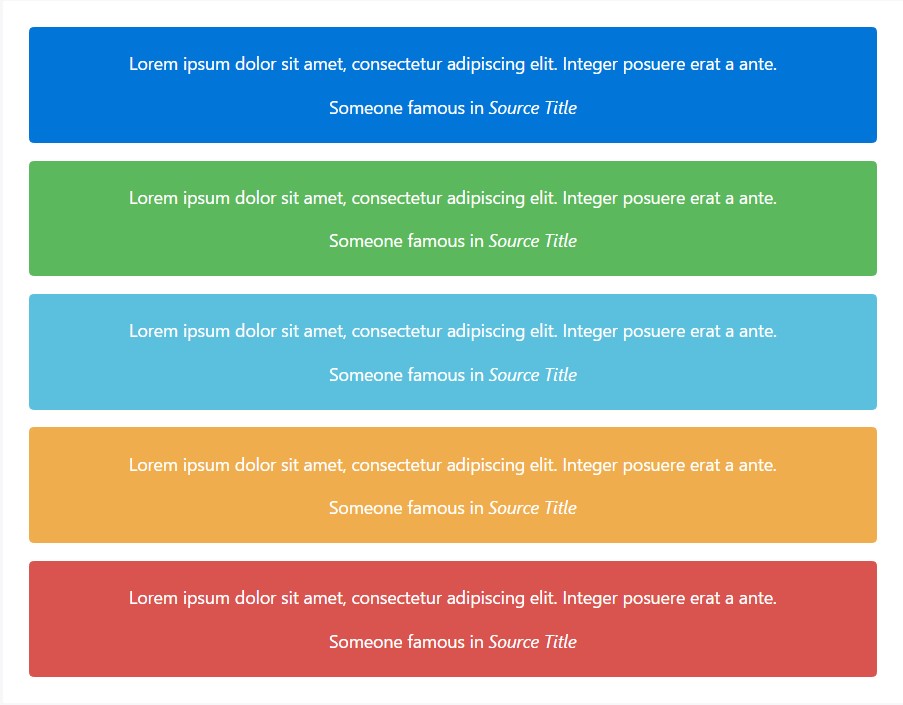
<div class="card card-inverse card-primary mb-3 text-center">
<div class="card-block">
<blockquote class="card-blockquote">
<p>Lorem ipsum dolor sit amet, consectetur adipiscing elit. Integer posuere erat a ante.</p>
<footer>Someone famous in <cite title="Source Title">Source Title</cite></footer>
</blockquote>
</div>
</div>
<div class="card card-inverse card-success mb-3 text-center">
<div class="card-block">
<blockquote class="card-blockquote">
<p>Lorem ipsum dolor sit amet, consectetur adipiscing elit. Integer posuere erat a ante.</p>
<footer>Someone famous in <cite title="Source Title">Source Title</cite></footer>
</blockquote>
</div>
</div>
<div class="card card-inverse card-info mb-3 text-center">
<div class="card-block">
<blockquote class="card-blockquote">
<p>Lorem ipsum dolor sit amet, consectetur adipiscing elit. Integer posuere erat a ante.</p>
<footer>Someone famous in <cite title="Source Title">Source Title</cite></footer>
</blockquote>
</div>
</div>
<div class="card card-inverse card-warning mb-3 text-center">
<div class="card-block">
<blockquote class="card-blockquote">
<p>Lorem ipsum dolor sit amet, consectetur adipiscing elit. Integer posuere erat a ante.</p>
<footer>Someone famous in <cite title="Source Title">Source Title</cite></footer>
</blockquote>
</div>
</div>
<div class="card card-inverse card-danger text-center">
<div class="card-block">
<blockquote class="card-blockquote">
<p>Lorem ipsum dolor sit amet, consectetur adipiscing elit. Integer posuere erat a ante.</p>
<footer>Someone famous in <cite title="Source Title">Source Title</cite></footer>
</blockquote>
</div>
</div>Transmitting meaning to assistive modern technologies
Employing color to include meaning only supplies a visual indication, which will not be conveyed to users of assistive technologies-- such as screen readers. Ensure that information signified by the color is either evident from the content itself (e.g. the visible text), or is featured through alternate means, such as extra text hidden with the .sr-only class.
Outline cards
Looking for a colored card, but not the heavy background colors they provide? Replace the default modifier classes with the .card-outline-* ones to design just the border-color of a card.

<div class="card card-outline-primary mb-3 text-center">
<div class="card-block">
<blockquote class="card-blockquote">
<p>Lorem ipsum dolor sit amet, consectetur adipiscing elit. Integer posuere erat a ante.</p>
<footer>Someone famous in <cite title="Source Title">Source Title</cite></footer>
</blockquote>
</div>
</div>
<div class="card card-outline-secondary mb-3 text-center">
<div class="card-block">
<blockquote class="card-blockquote">
<p>Lorem ipsum dolor sit amet, consectetur adipiscing elit. Integer posuere erat a ante.</p>
<footer>Someone famous in <cite title="Source Title">Source Title</cite></footer>
</blockquote>
</div>
</div>
<div class="card card-outline-success mb-3 text-center">
<div class="card-block">
<blockquote class="card-blockquote">
<p>Lorem ipsum dolor sit amet, consectetur adipiscing elit. Integer posuere erat a ante.</p>
<footer>Someone famous in <cite title="Source Title">Source Title</cite></footer>
</blockquote>
</div>
</div>
<div class="card card-outline-info mb-3 text-center">
<div class="card-block">
<blockquote class="card-blockquote">
<p>Lorem ipsum dolor sit amet, consectetur adipiscing elit. Integer posuere erat a ante.</p>
<footer>Someone famous in <cite title="Source Title">Source Title</cite></footer>
</blockquote>
</div>
</div>
<div class="card card-outline-warning mb-3 text-center">
<div class="card-block">
<blockquote class="card-blockquote">
<p>Lorem ipsum dolor sit amet, consectetur adipiscing elit. Integer posuere erat a ante.</p>
<footer>Someone famous in <cite title="Source Title">Source Title</cite></footer>
</blockquote>
</div>
</div>
<div class="card card-outline-danger text-center">
<div class="card-block">
<blockquote class="card-blockquote">
<p>Lorem ipsum dolor sit amet, consectetur adipiscing elit. Integer posuere erat a ante.</p>
<footer>Someone famous in <cite title="Source Title">Source Title</cite></footer>
</blockquote>
</div>
</div>Card setup
In addition to styling the content within cards, Bootstrap offers some choices for laying out collection of cards. For the time being, such layout choices are not yet responsive.
Card groups
Use card groups to make cards as a single, connected item with identical width and height columns. Card groups use display: flex; to achieve their uniform sizing.

<div class="card-group">
<div class="card">
<div class="img"><img class="card-img-top" src="..." alt="Card image cap"></div>
<div class="card-block">
<h4 class="card-title">Card title</h4>
<p class="card-text">This is a wider card with supporting text below as a natural lead-in to additional content. This content is a little bit longer.</p>
<p class="card-text"><small class="text-muted">Last updated 3 mins ago</small></p>
</div>
</div>
<div class="card">
<div class="img"><img class="card-img-top" src="..." alt="Card image cap"></div>
<div class="card-block">
<h4 class="card-title">Card title</h4>
<p class="card-text">This card has supporting text below as a natural lead-in to additional content.</p>
<p class="card-text"><small class="text-muted">Last updated 3 mins ago</small></p>
</div>
</div>
<div class="card">
<div class="img"><img class="card-img-top" src="..." alt="Card image cap"></div>
<div class="card-block">
<h4 class="card-title">Card title</h4>
<p class="card-text">This is a wider card with supporting text below as a natural lead-in to additional content. This card has even longer content than the first to show that equal height action.</p>
<p class="card-text"><small class="text-muted">Last updated 3 mins ago</small></p>
</div>
</div>
</div>When utilizing card groups with footers, their content is going to automatically line up.
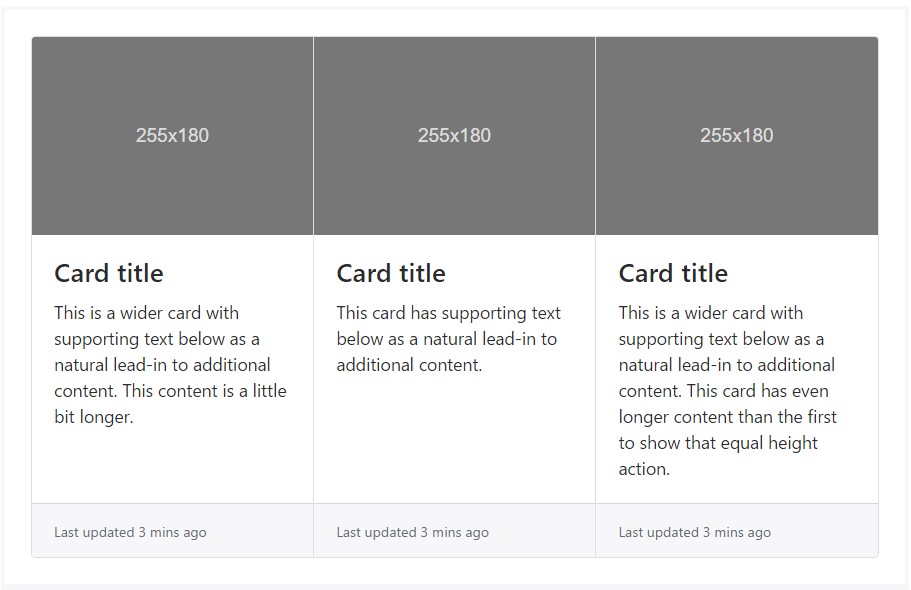
<div class="card-group">
<div class="card">
<div class="img"><img class="card-img-top" src="..." alt="Card image cap"></div>
<div class="card-block">
<h4 class="card-title">Card title</h4>
<p class="card-text">This is a wider card with supporting text below as a natural lead-in to additional content. This content is a little bit longer.</p>
</div>
<div class="card-footer">
<small class="text-muted">Last updated 3 mins ago</small>
</div>
</div>
<div class="card">
<div class="img"><img class="card-img-top" src="..." alt="Card image cap"></div>
<div class="card-block">
<h4 class="card-title">Card title</h4>
<p class="card-text">This card has supporting text below as a natural lead-in to additional content.</p>
</div>
<div class="card-footer">
<small class="text-muted">Last updated 3 mins ago</small>
</div>
</div>
<div class="card">
<div class="img"><img class="card-img-top" src="..." alt="Card image cap"></div>
<div class="card-block">
<h4 class="card-title">Card title</h4>
<p class="card-text">This is a wider card with supporting text below as a natural lead-in to additional content. This card has even longer content than the first to show that equal height action.</p>
</div>
<div class="card-footer">
<small class="text-muted">Last updated 3 mins ago</small>
</div>
</div>
</div>Card decks
Required a set of equivalent width as well as height cards that aren't connected to each other? Use card decks.

<div class="card-deck">
<div class="card">
<div class="img"><img class="card-img-top" src="..." alt="Card image cap"></div>
<div class="card-block">
<h4 class="card-title">Card title</h4>
<p class="card-text">This is a longer card with supporting text below as a natural lead-in to additional content. This content is a little bit longer.</p>
<p class="card-text"><small class="text-muted">Last updated 3 mins ago</small></p>
</div>
</div>
<div class="card">
<div class="img"><img class="card-img-top" src="..." alt="Card image cap"></div>
<div class="card-block">
<h4 class="card-title">Card title</h4>
<p class="card-text">This card has supporting text below as a natural lead-in to additional content.</p>
<p class="card-text"><small class="text-muted">Last updated 3 mins ago</small></p>
</div>
</div>
<div class="card">
<div class="img"><img class="card-img-top" src="..." alt="Card image cap"></div>
<div class="card-block">
<h4 class="card-title">Card title</h4>
<p class="card-text">This is a wider card with supporting text below as a natural lead-in to additional content. This card has even longer content than the first to show that equal height action.</p>
<p class="card-text"><small class="text-muted">Last updated 3 mins ago</small></p>
</div>
</div>
</div>Like with card groups, card footers in decks are going to automatically line up.
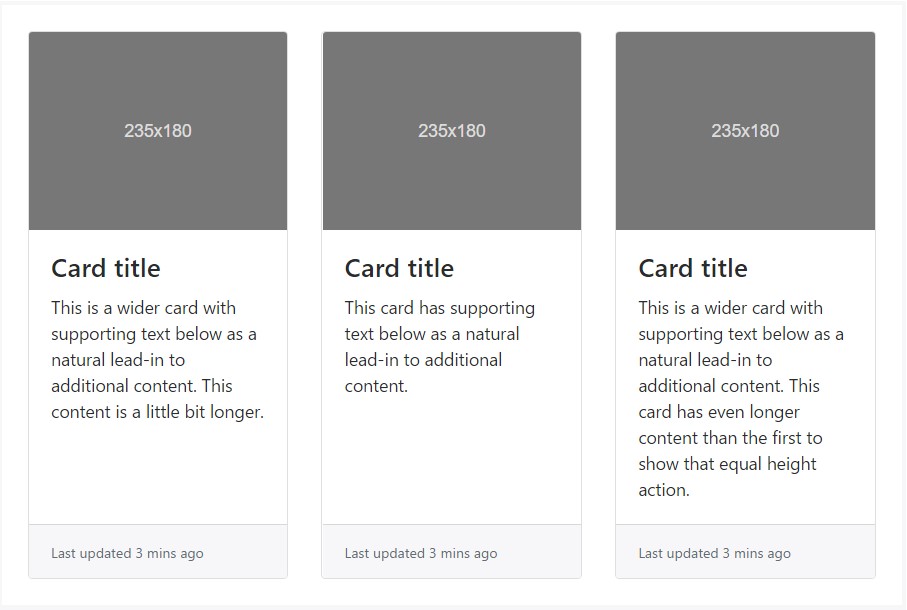
<div class="card-deck">
<div class="card">
<div class="img"><img class="card-img-top" src="..." alt="Card image cap"></div>
<div class="card-block">
<h4 class="card-title">Card title</h4>
<p class="card-text">This is a wider card with supporting text below as a natural lead-in to additional content. This content is a little bit longer.</p>
</div>
<div class="card-footer">
<small class="text-muted">Last updated 3 mins ago</small>
</div>
</div>
<div class="card">
<div class="img"><img class="card-img-top" src="..." alt="Card image cap"></div>
<div class="card-block">
<h4 class="card-title">Card title</h4>
<p class="card-text">This card has supporting text below as a natural lead-in to additional content.</p>
</div>
<div class="card-footer">
<small class="text-muted">Last updated 3 mins ago</small>
</div>
</div>
<div class="card">
<div class="img"><img class="card-img-top" src="..." alt="Card image cap"></div>
<div class="card-block">
<h4 class="card-title">Card title</h4>
<p class="card-text">This is a wider card with supporting text below as a natural lead-in to additional content. This card has even longer content than the first to show that equal height action.</p>
</div>
<div class="card-footer">
<small class="text-muted">Last updated 3 mins ago</small>
</div>
</div>
</div>Card columns
Cards are ordered from top to bottom and left to.
Carry on! Your distance with card columns may vary. To prevent cards breaking across columns, set them to display: inline-block as column-break-inside: avoid isn't a bulletproof solution yet.
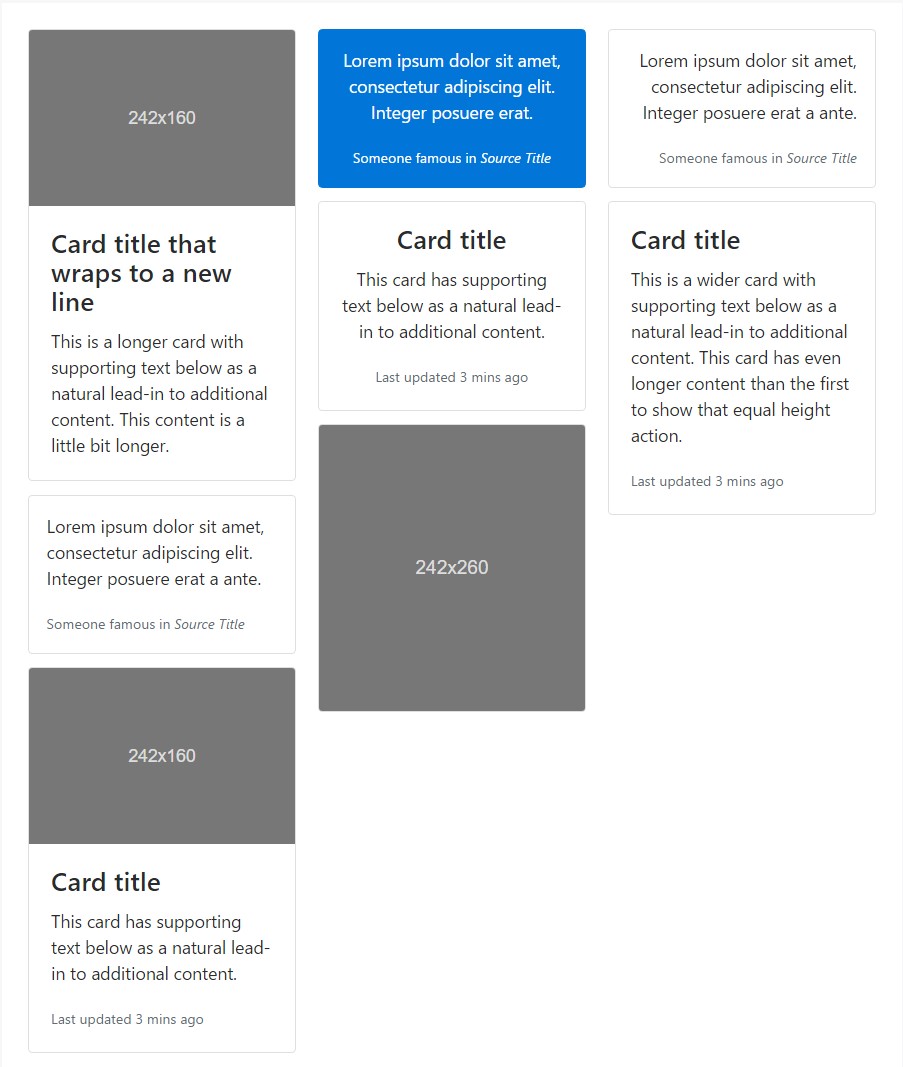
<div class="card-columns">
<div class="card">
<div class="img"><img class="card-img-top img-fluid" src="..." alt="Card image cap"></div>
<div class="card-block">
<h4 class="card-title">Card title that wraps to a new line</h4>
<p class="card-text">This is a longer card with supporting text below as a natural lead-in to additional content. This content is a little bit longer.</p>
</div>
</div>
<div class="card p-3">
<blockquote class="card-block card-blockquote">
<p>Lorem ipsum dolor sit amet, consectetur adipiscing elit. Integer posuere erat a ante.</p>
<footer>
<small class="text-muted">
Someone famous in <cite title="Source Title">Source Title</cite>
</small>
</footer>
</blockquote>
</div>
<div class="card">
<div class="img"><img class="card-img-top img-fluid" src="..." alt="Card image cap"></div>
<div class="card-block">
<h4 class="card-title">Card title</h4>
<p class="card-text">This card has supporting text below as a natural lead-in to additional content.</p>
<p class="card-text"><small class="text-muted">Last updated 3 mins ago</small></p>
</div>
</div>
<div class="card card-inverse card-primary p-3 text-center">
<blockquote class="card-blockquote">
<p>Lorem ipsum dolor sit amet, consectetur adipiscing elit. Integer posuere erat.</p>
<footer>
<small>
Someone famous in <cite title="Source Title">Source Title</cite>
</small>
</footer>
</blockquote>
</div>
<div class="card text-center">
<div class="card-block">
<h4 class="card-title">Card title</h4>
<p class="card-text">This card has supporting text below as a natural lead-in to additional content.</p>
<p class="card-text"><small class="text-muted">Last updated 3 mins ago</small></p>
</div>
</div>
<div class="card">
<div class="img"><img class="card-img img-fluid" src="..." alt="Card image"></div>
</div>
<div class="card p-3 text-right">
<blockquote class="card-blockquote">
<p>Lorem ipsum dolor sit amet, consectetur adipiscing elit. Integer posuere erat a ante.</p>
<footer>
<small class="text-muted">
Someone famous in <cite title="Source Title">Source Title</cite>
</small>
</footer>
</blockquote>
</div>
<div class="card">
<div class="card-block">
<h4 class="card-title">Card title</h4>
<p class="card-text">This is a wider card with supporting text below as a natural lead-in to additional content. This card has even longer content than the first to show that equal height action.</p>
<p class="card-text"><small class="text-muted">Last updated 3 mins ago</small></p>
</div>
</div>
</div>Card columns can additionally be expanded and also personalized with some additional code. Shown listed below is an expansion of the .card-columns course making use of the exact same CSS-- CSS columns-- to produce a set of receptive tiers for altering the variety of columns.
.card-columns
@include media-breakpoint-only(lg)
column-count: 4;
@include media-breakpoint-only(xl)
column-count: 5;Final thoughts
Thus essentially this is the method the bright new to Bootstrap 4 card section becomes quickly set up. As always aiming for easiness and simplicity the new framework version integrates the performance of several sections into a effective and single one. Now you should pick up the components you need to be outlined in some cards.
Check out several youtube video guide relating to Bootstrap Panel Table:
Related topics:
Bootstrap Panel-Cards: approved records
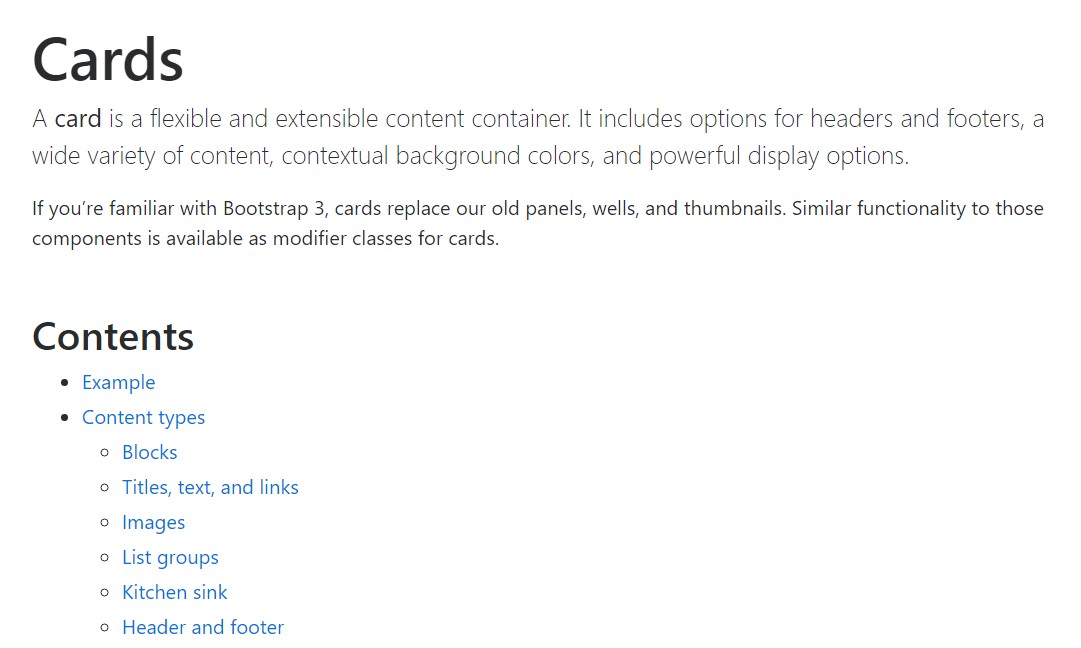
Insights on precisely how can we develop Bootstrap 4 cards all the same height?
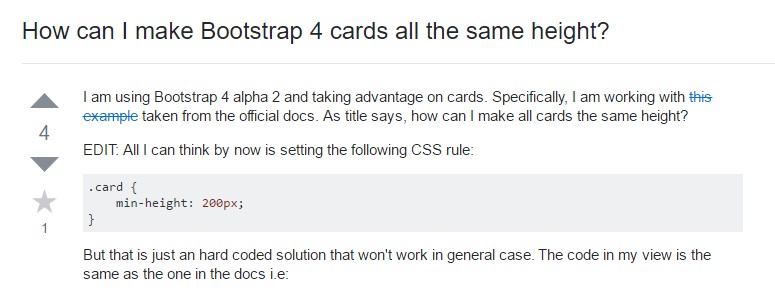
Missing past panel look for cards
